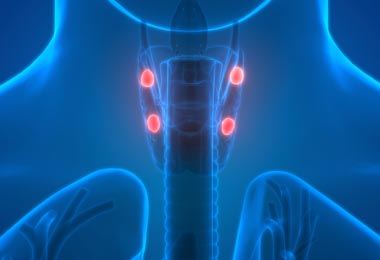Thyroid Disorders
Problems with the thyroid include a variety of disorders that can result in the gland producing too little thyroid hormone (hypothyroidism) or too much (hyperthyroidism). Thyroid disorders can affect heart rate, mood, energy level, metabolism, bone health, pregnancy and many other functions.
What You Need to Know
- Thyroid disorder symptoms depend on whether the thyroid is under- or over-producing hormones.
- Some thyroid issues are autoimmune ― they are due to the body’s immune system attacking the thyroid gland.
- Treatment for thyroid disorders is often successful and, depending on the condition, may involve medication, surgery or other therapy.
What does the thyroid do?
The thyroid is a butterfly-shaped gland located in the front of the neck. It produces hormones that play a key role in regulating blood pressure, body temperature, heart rate, metabolism and the reaction of the body to other hormones.
The two main hormones produced by the thyroid are triiodothyronine, or T3, and thyroxine (T4). The gland also produces calcitonin, which helps bone cells process calcium and add it to the bones.
Types of Thyroid Disorders
Many disorders of the thyroid require care by a physician or other health care professional.
Hyperthyroidism
Hyperthyroidism can lead to Graves’ disease, which has many symptoms, including sweating, arrhythmia (irregular heartbeat), weight loss, protruding eyes and nervousness.
Hypothyroidism
Symptoms of hypothyroidism can include tiredness, weight gain, depression, abnormal bone development and stunted growth. The most common cause is autoimmune: the production of antibodies that attack the thyroid gland.
Hashimoto’s Thyroiditis
Hashimoto's thyroiditis, an autoimmune disorder, is an inflammation of the thyroid gland. It can cause a goiter (swelling in the neck due to an enlarged thyroid gland) and other symptoms.
Thyroid Tumors
Thyroid nodules and adenomas, small, noncancerous growths, start in the cell layer that lines the inner surface of the thyroid gland. The adenoma itself may secrete thyroid hormone and may cause hyperthyroidism. Thyroid adenoma treatment may include surgery to remove the overactive nodule.
Thyroid Cancer
Thyroid cancer occurs more often in people who have undergone radiation to the head, neck or chest. However, it may also occur in those without any known risk factors. There are four main types of thyroid cancer: papillary thyroid cancer, follicular thyroid cancer, anaplastic thyroid cancer and medullary thyroid cancer. Most thyroid cancer can be treated successfully.
Thyroid Disorders in Women
Women’s thyroid disease can affect their hormone balance and cause problems in puberty, menstruation, fertility, pregnancy and the postpartum period.
Thyroid Hormone Replacement Therapy
Thyroid hormone comes in pill form and is often used to treat an underactive thyroid that is secreting little or no thyroid hormones. The most commonly prescribed thyroid hormone replacement is synthetic thyroxine (T4).
Hypothyroidism and Pregnancy
Thyroid hormones pass from mother to fetus, and adequate amounts are important for normal growth and brain development. Hypothyroidism during pregnancy can be treated safely with thyroid hormone medications.
Postpartum Thyroiditis
Postpartum thyroiditis is inflammation of the thyroid gland that occurs after giving birth and can cause hyper- or hypothyroidism. It is treatable with medication, and in about 80% of cases resolves after 12 to 18 months.




